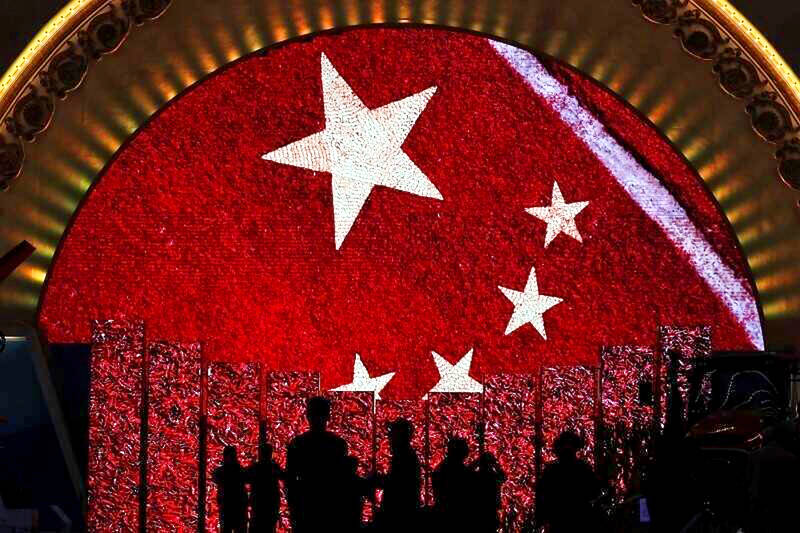Beijing aims to establish a political party in Taiwan using Taiwanese entertainers and social media influencers to attract members, people who have allegedly received a prospectus letter from China said yesterday.
Singer Alexis Ho (何以奇) and musician Hsieh Ho-hsien (謝和弦), also known as “R-chord” were among those who told reporters they received letters sent from a media company based in Beijing.
They said the letters outlined a plan to form a party with funding of about NT$450 million (US$13.91 million).

Photo: AP
The “Taiwan Support Peace Party” (台灣擁和黨), would not be affiliated with the pan-blue or pan-green camps, so it could work with either, Ho quoted the letter as saying, adding that its central tenet would be promoting peace.
She said she knows of other entertainers who have received the letters, which allegedly claim they could earn more than NT$10 million a year working with more than 10 media companies in China ready to offer advertising and endorsement deals, music concerts, TV shows and public appearances.
The prospectus allegedly promised that affiliation with the party would not bring participants any trouble and they were not required to invest any money, she said.
However, they must agree to a statement, titled “Establishing New Forms of Cross-strait Relations,” and endorse it by posting on their social media accounts, Ho said.
The NT$450 million has been registered in a fund in a tax haven bank in the Caribbean, which can be channeled into Taiwan, the letter allegedly says, as overseas donations and financial support for political groups are restricted in Taiwan.
Entertainers and prominent figures would take up party leadership positions, while media companies in Beijing and Henan Province would handle funding and other efforts, the letter allegedly says, adding that the party would field candidates in the 2026 nine-in-one local elections.
Hsieh said he had received the letter three times, inviting him to join as a “founding member,” while promising financial rewards through work in China.
He said it mentioned convening a party congress in Taipei next month.
The letter claimed to already have a comprehensive list of Taiwanese actors, TV hosts, models, news anchors, content creators and social media influencers, and has recruited a famous singer as the party chairperson, as well as another prominent celebrity as a deputy chairperson, both of whom were reportedly previously close to the Democratic Progressive Party, Hsieh said.
It is clear that China’s new “united front” campaign aims to use local celebrities and online personalities to influence younger Taiwanese, he said.
“For me, I refused them... I grew up in Nantou County’s Puli Township (埔里), and I am a proud Taiwanese. As for China’s promise of money, no thanks. I can earn NT$10 million through my own honest work,” Hsieh wrote online.
The Mainland Affairs Council said that it is aware of the letters, and would strive to verify the information, adding that Taiwanese entertainers could run afoul of the law and possibly contravene the Anti-Infiltration Act (反滲透法) if funding for the party originated from the Chinese government or the Chinese Communist Party.

The CIA has a message for Chinese government officials worried about their place in Chinese President Xi Jinping’s (習近平) government: Come work with us. The agency released two Mandarin-language videos on social media on Thursday inviting disgruntled officials to contact the CIA. The recruitment videos posted on YouTube and X racked up more than 5 million views combined in their first day. The outreach comes as CIA Director John Ratcliffe has vowed to boost the agency’s use of intelligence from human sources and its focus on China, which has recently targeted US officials with its own espionage operations. The videos are “aimed at

STEADFAST FRIEND: The bills encourage increased Taiwan-US engagement and address China’s distortion of UN Resolution 2758 to isolate Taiwan internationally The Presidential Office yesterday thanked the US House of Representatives for unanimously passing two Taiwan-related bills highlighting its solid support for Taiwan’s democracy and global participation, and for deepening bilateral relations. One of the bills, the Taiwan Assurance Implementation Act, requires the US Department of State to periodically review its guidelines for engagement with Taiwan, and report to the US Congress on the guidelines and plans to lift self-imposed limitations on US-Taiwan engagement. The other bill is the Taiwan International Solidarity Act, which clarifies that UN Resolution 2758 does not address the issue of the representation of Taiwan or its people in

US Indo-Pacific Commander Admiral Samuel Paparo on Friday expressed concern over the rate at which China is diversifying its military exercises, the Financial Times (FT) reported on Saturday. “The rates of change on the depth and breadth of their exercises is the one non-linear effect that I’ve seen in the last year that wakes me up at night or keeps me up at night,” Paparo was quoted by FT as saying while attending the annual Sedona Forum at the McCain Institute in Arizona. Paparo also expressed concern over the speed with which China was expanding its military. While the US

SHIFT: Taiwan’s better-than-expected first-quarter GDP and signs of weakness in the US have driven global capital back to emerging markets, the central bank head said The central bank yesterday blamed market speculation for the steep rise in the local currency, and urged exporters and financial institutions to stay calm and stop panic sell-offs to avoid hurting their own profitability. The nation’s top monetary policymaker said that it would step in, if necessary, to maintain order and stability in the foreign exchange market. The remarks came as the NT dollar yesterday closed up NT$0.919 to NT$30.145 against the US dollar in Taipei trading, after rising as high as NT$29.59 in intraday trading. The local currency has surged 5.85 percent against the greenback over the past two sessions, central